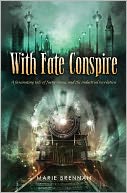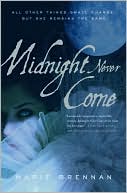Brennan & Hines on Ending a Series (Part 2)
This is part two of the discussion between myself and Marie Brennan about wrapping up our four-book series this year. Part one is posted on her blog at http://swan-tower.livejournal.com/491310.html

I’m the author of six fantasy novels and more than 30 published short stories, which puts me just a little behind him. I’ve written about people split in half (mystically, not with an axe) and faeries hiding out underneath London, and I’m currently writing about a nineteenth-century gentlewoman who travels around the world to study dragons and get into trouble, not necessarily in that order. I am a mildly popular blogger, and alas, have no fuzzy beasts to take care of — unless you count my husband.
She writes a very thoughtful blog at http://swan-tower.livejournal.com. Her latest book is With Fate Conspire, which I reviewed earlier this month.
#
Jim: I definitely understand the urge to bring everything and everyone back for the grand finale. I did it in the final goblin book too, bringing in characters from both the first and second book. With the princess series, that impulse wasn’t quite as strong, but it was still there. There were certain characters and storylines that had gotten a reasonable amount of closure (Talia’s children, for example), but I still wanted to bring three books worth of characters and information back for the last one.
Some characters fit pretty well. I brought Hephyra the dryad captain back because she’s awesome, but also because it fit the story. Likewise with the Duchess, one of the background villains from the whole series. But the merfolk didn’t fit, and get nothing but a quick mention. Other characters were omitted because there was no immediate, unresolved story there.
At the same time, there were some unanswered questions. I’ve already had people e-mail me to ask whether Talia ever sees her kids again. But I think that’s okay. Some unanswered questions mean the reader has more to imagine and wonder about after they put down the book. The important thing is that they’re not questions which I’ve implicitly agreed to answer. It’s the reader-writer contract. The Duchess has a bit in the first book where she tells Danielle that she’ll need her help someday. I made an unspoken agreement to follow up on that.
I think the fact that you’ve considered continuing the series is a good thing, actually. A story which wraps everything up too neatly isn’t believable, whereas if you’re considering coming back eventually, I suspect you’re more likely to acknowledge in the narrative that life goes on after “THE END.”
I think one of the most interesting things in finishing up the princess series is the way that experience informed my newest project. I find myself taking a more deliberate long-term approach to the Magic Ex Libris series, looking at stories four or five books down the line, and that’s something I’ve never done before. It’s scary, but also exciting … assuming I don’t completely screw it up. What about you? How are you approaching the book-writing process now after wrapping up such an impressive project?
Marie: Yes, my new proposal was intended from the start to be a series, and that means I’m looking at it very differently. Again, it’s meant to be kind of episodic; the protagonist is a dragon naturalist, and each book involves a different field expedition to a different part of her world, with her getting into different kinds of trouble there. 🙂 But this time, I have my eye on an arc plot from the beginning, because science can be like that; you learn one thing and then another thing and then one day you step back and see how it all interlocks. (Especially nineteenth-century science, when so many discoveries are about putting the basic picture together.)
It’s hairy, though, because every decision you make, you find yourself wondering “what if I change my mind later?” And it gets extra hairy when, as in the case of this series, the entire thing is being written as a retrospective first-person account; the novels are Isabella’s memoirs. That means I ought to be doing a lot of clever foreshadowing, hinting at future excitement and revelations. I’m lucky that I’m going to have a solid window of time in which I’m writing the second book, but can still make changes to the first; I might even have a finished draft of #2 before #1 goes to be copy-edited. I know that as I work on that book, my understanding of the setting and the characters is going to expand and deepen. It still won’t be the whole story — if this goes to a five-book series, as I hope it will, that’s still only 40% of the picture — but I’ll at least have a bit longer to chew on the question of where I’m going, and redirect things if I decide that, oh, Isabella contracts horrible jungle fever in book 4 and has her legs amputated. That’s the kind of thing the earlier narrative should hint at, you know?
. . . I have no idea why I keep setting myself these kinds of challenges. Each book takes place in a different century! Or a different country! And my pov character knows the whole story, which means I have to know it, too! Makes me wish I were writing a standard-issue three-volume epic quest fantasy, with no structural stunts or pov tricks.
Okay, not really. But sometimes it’s nice to dream.
Jim: One final question — if you were starting over on the Onyx Court series, what’s one thing you’d change? For me, it would probably be tone … I wrote The Stepsister Scheme in between writing the second and third goblin books, and the tone of that one doesn’t really match where I went with the rest of the series. It’s close, but lighter and a little sillier at times than the subsequent books. What about you?

I don’t think it’s an accident, that both of us want to tweak the first book of the series. Hindsight is 20/20, and all that . . . .
Jim: And that’s our chat. Thanks to those who’ve read the whole thing, and my thanks to Marie for coming up with the idea!





